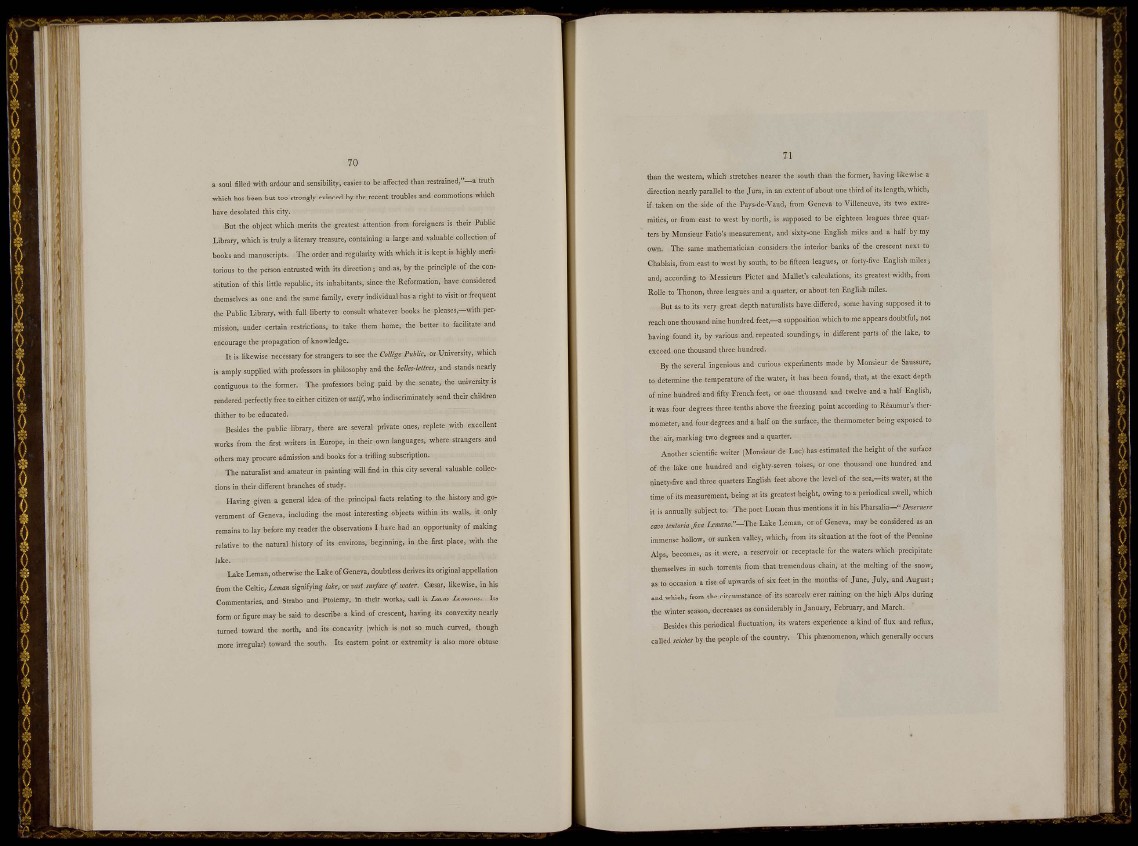
S i . J.
a soul filled with ardour and sensibility, easier to be affected than restrained,"—a truth
ivhich has been but too strongly evinced by tlie reccnt troubles and commotions which
have desolated this city.
But the object which merits the greatest attention from foreigners is their Public
Library, which is truly a literary treasure, containing a large and valuable collection of
books and manuscripts. The order and regularity with which it is kept is highly meritorinus
to the person entrusted with its direction; and as, by the principle of the constitution
of this little republic, its inhabitants, since the Reformation, have considered
themselves as one and the same family, every individual has a right to visit or frequent
the Public Library, with full liberty to consult whatever books he pleases,—with permission,
under certain restrictions, to take them home, the better to facilitate and
encourage the propagation of knowledge.
It is likewise necessary for strangers to see the College PMk, or University, which
is amply supplied with professors in philosophy and the belks-lelln,, and stands nearly
contiguous to the former. The professors being paid by the senate, the university is
rendered perfecfly free to either citizen or nalif, who indiscriminately send their children
thither to he educated.
Besides the public library, there are several private ones, replete with excellent
works from the first writers in Europe, in their own languages, where strangers and
others may procure admission and hooks for a trifling subscription.
The naturalist and amateur in painting will find in this city several valuable collections
in their different branches of study.
Having given a general idea of the principal facts relating to the history and government
of Geneva, including the most interesting objects within its walls, it only
remains to lay before my reader the observations I have had an opportunity of making
relative to the natiiral history of its environs, beginning, in the first place, with the
lake.
Lake Leman, otherwise the Lake of Geneva, doubtless derives its original appellation
fiom the Celtic, Leman signifying tote, or vast mrfaie of viater. Cisar, likewise, in his
Commentaries, and Straho and Ptolemy, in their works, call it Lacui Uma„u,. Its
form or figure may be said to describe a kind of crescent, having its convexity nearly
turned toward the north, and its concavity (which is not so much curved, though
more irregular) toward the south. Its eastern point or extremity is also more obtuse
i'i -
tiian the western, which stretches nearer the south than the former, having likewise a
direction nearly parallel to the Jura, in an extent of about one third of its length, which,
if taken on the side of the Pays-de-Vaud, from Geneva to Villeneuve, its two extremities,
or from east to west by north, is supposed to be eighteen leagues three quarters
by Monsieur Fatio's measurement, and sixty-one English miles and a half by my
own. The same mathematician considers the interior banks of the crescent next to
Chahlais, fiom east to west by south, to he fifteen leagues, or forty-five English miles ;
and, according to Messieurs Pictet and Mallet's calculations, its greatest width, from
Rolle to Thonon, three leagues and a quarter, or about ten English miles.
But as to its very great depth naturalists have differed, some having supposed it to
reach one tiiousand nine hundred feet,—a supposition which to me appears doubtful, not
having found it, by various and repeated soundings, in different parts of flic lake, to
exceed one thousand three hundred.
By the several ingenious and curious experiments made by Monsieur de Saussure,
to determine the temperature of the water, it has been found, that, at the exact depth
of nine hundred and fifty French feet, or one thousand and twelve and a half English,
it was four degrees three tenths above the freezing point according to Reaumur's thermometer,
and four degrees and a half on the surface, the thermometer being exposed to
the air, marking two degrees and a quarter.
Another scientific writer (Monsieur de Luc) has estimated the height of the surface
of the lake one hundred and eighty-seven toises, or one thousand one hundred and
ninety-five and three quarters English feet above tiie level of the se. ,-i t s water, at the
time of its measurement, being at its greatest height, owing to a periodical swell, which
it is annually subject to. The poet Lucan thus mentions it in his Pharsalia—«ttiOTOT
cm taiorio. ,fm i>mono."-The Lake Leman, or of Geneva, may be considered as an
immense hollow, or sunken valley, which, from its situation at the foot of the Pennine
Alps, becomes, as it were, a reservoir or receptacle for the waters which precipitate
themselves in such torrents from that tremendous chain, at the melting of the snow,
as to occasion a rise of upwards of six feet in the months of June, July, and August;
and which, from the circumstance of its scarcely ever raining on the high Alps during
the winter season, decreases as considerably in January, February, and March.
Besides this periodical fluctuation, its waters experience a kind of flux and reflux,
called sekhei by the people of the country. This phsenomenon, which generally occurs
r